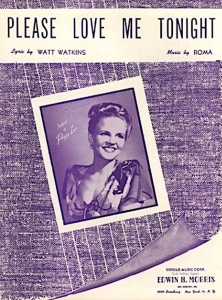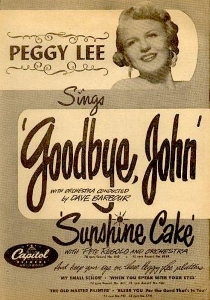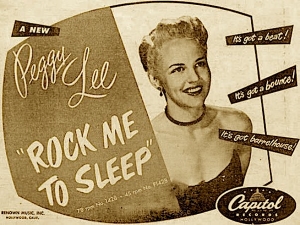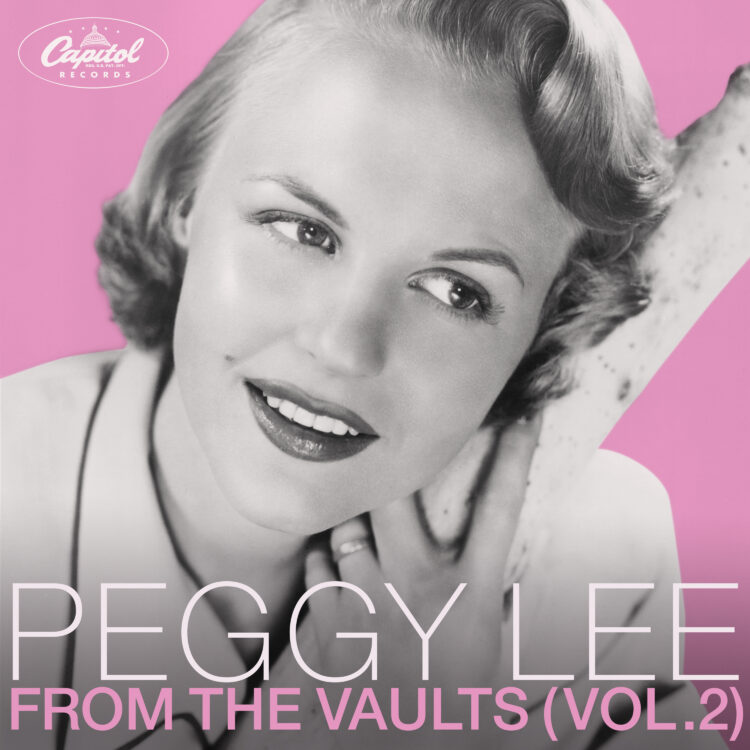Capitol Records / Universal Music Enterprises
Release date: May 24, 2024
LOS ANGELES, CA – May 24, 2024 – Capitol Records and Universal Music Enterprises (UMe), in conjunction with Peggy Lee Associates, today release Peggy Lee: From the Vaults (Vol. 2), the second installment in the new digital series that features rare tracks currently unavailable on streaming platforms. Recorded for Capitol between 1948 and 1951, the 12 selections on From the Vaults (Vol. 2) include songs from stage and screen by American songbook giants Irving Berlin and Yip Harburg; a song co-written by jazz great Benny Carter; another by classical-popular composer Alec Wilder; and one co-written by Lee herself.
Nine of the collection’s tracks feature orchestral backing by Dave Barbour, Lee’s first husband, with whom she co-wrote several chart hits in the 1940s, among them “I Don’t Know About Enough About You,” “It’s a Good Day” and “Mañana,” one of the top-selling singles of 1948. From the Vaults (Vol. 2) offers the digital debut of the couple’s joyous and hard-swinging tune “Happy Music,” which served as the B-side to Lee’s 1950 charting single “Show Me the Way to Get Out of This World.” Barbour’s solo guitar work is featured on several selections.
From the Broadway stage come two songs from then-new musicals. Lee was among the first to record Irving Berlin’s “You Can Have Him” from 1949’s Miss Liberty, along with Doris Day and Dinah Shore; the song was later recorded by Ella Fitzgerald, Nina Simone and Nancy Wilson. “He’s Only Wonderful” by Sammy Fain and E. Y. “Yip” Harburg originated in the short-lived 1951 fantasy Flahooley, where it was introduced by Barbara Cook in her Broadway debut; Lee and Sarah Vaughan were the only major singers to record it for popular release. From the 1949 20th Century-Fox drama Come to the Stable comes the haunting “Through a Long and Sleepless Night” (by Mack Gordon and Alfred Newman), which was also recorded by Vic Damone, Bobby Darin and Sarah Vaughan.
Lee’s association with composer, arranger, bandleader and multi-instrumentalist Benny Carter spanned her entire recording career, from the early 1940s to the mid-1990s, and is represented on From the Vaults (Vol. 2) by the rollicking “Rock Me to Sleep,” co-written by Carter and Paul Vandervoort II. Another longtime associate, composer Alec Wilder, is best remembered for his songs “While We’re Young” and “I’ll Be Around,” as well as his landmark 1972 book American Popular Song: The Great Innovators, 1900-1950. Of his ballad “Goodbye, John,” written with Edward Eager and featured on From the Vaults (Vol. 2), Wilder wrote to Lee: “How absolutely dear and loving that record was! Every word you uttered I believed and every note you sang was definitive.”
Other highlights on From the Vaults (Vol. 2) include “Save Your Sorrow for Tomorrow,” a 1920s chestnut revitalized by Lee and arranger/conductor Pete Rugolo; and “Cry, Cry, Cry” with a lyric by bandleader/singer Vaughn Monroe, which was recorded by both Lee and one of her favorite singers, Mildred Bailey. Rounding out this volume are the songs “Helpless,” “The Mill on the Floss,” “Once in a Lifetime (Only Once)” and “Please Love Me Tonight.”
With the release of the four-volume From the Vaults digital series, Lee’s entire catalog of issued master recordings from the Universal family of labels — Capitol, Decca, A&M, and Polydor — will be accessible via digital streaming. The third volume in the series will move chronologically from 1951 to 1969; a fourth volume will compile duets and other musical collaborations recorded between 1947 and 1972, Peggy Lee’s last year under contract with Capitol Records.
From the Vaults (Vol. 2) Track Listing
Dates in parentheses denote recording date

- Please Love Me Tonight (12/29/48)
- You Can Have Him (5/25/49)
- Goodbye, John (6/3/49)
- Through a Long and Sleepless Night (6/3/49)
- Save Your Sorrow for Tomorrow (10/7/49)
- Cry, Cry, Cry (3/13/50)
- Helpless (3/13/50)
- Happy Music* (6/16/50)
- Once in a Lifetime (Only Once) (9/14/50)
- The Mill on the Floss (12/26/50)
- Rock Me to Sleep (2/8/51)
- He’s Only Wonderful (4/5/51)
* written by Peggy Lee and Dave Barbour
Song Notes
All songs backed by Dave Barbour and His Orchestra except where noted
Please Love Me Tonight (Herman Watkins, Ruth Wilkinson) (12/29/48)
Very little information is available about “Please Love Me Tonight” and its songwriters, Herman Watkins and Ruth Wilkinson, and no other recordings have been identified. Lee’s photo graced the cover of the sheet music for it, in which the songwriters are identified as Watt Watkins and Roma. Lee recorded it on December 29, 1948 – one of only five songs she recorded that year due to a recording ban resulting from an American Federation of Musicians strike. When released as a Capitol Records single, the song served as the B-side to “Riders in the Sky (A Cowboy Legend),” which became a #2 chart hit for Lee in the spring of 1949.
You Can Have Him (Irving Berlin) (5/25/49)
Irving Berlin’s “You Can Have Him” was a duet from the 1949 Broadway musical Miss Liberty, which told a fictional tale about a reporter’s effort to locate the model for the Statue of Liberty. Columbia Records released the original cast album as well as a popular single featuring two of the label’s star vocalists, Doris Day and Dinah Shore. For her 1949 version on Capitol, Lee refashioned the song as a solo, as did Helen Forrest, Fran Warren and Eve Young for their versions that year. The song was later recorded by Ella Fitzgerald, Eydie Gorme, Nina Simone and Nancy Wilson, among others.

Goodbye, John (Edward Eager, Alec Wilder) (6/3/49)
Peggy Lee’s friendship with songwriter Alec Wilder dates back to her days with Benny Goodman in the early 1940s. Over the course of her long career she recorded Wilder’s best-known songs (“I’ll Be Around,” “Trouble Is a Man,” “While We’re Young”) as well as some less familiar ones like the tender ballad “Goodbye, John.” Wilder, a legendary curmudgeon, praised Lee’s recording of this song in his 1975 book Letters I Never Mailed: “How absolutely dear and loving that record was! Every word you uttered I believed and every note you sang was definitive. Dave [Barbour’s guitar] section was a model of distillation and choice! Really a very special record for anyone, let alone the writer of the music.” The song was also recorded by Teresa Brewer, Anita Ellis, Carol Lawrence and Mabel Mercer, who may have introduced the song in performance but recorded it three years after Lee’s recording, which was the first.
Through a Long and Sleepless Night (Mack Gordon, Alfred Newman) (6/3/49)
“Through a Long and Sleepless Night” originated in the 1949 20th Century-Fox drama Come to the Stable starring Loretta Young. It was sung in the film by Dorothy Patrick and Hugh Marlowe (dubbed by Eileen Wilson and Ken Darby). The film’s musical director, Alfred Newman, wrote the melody, and Mack Gordon the lyrics. It was recorded by several other singers in 1949, including Vic Damone, Vera Lynn and Dinah Shore. Later versions were recorded by Polly Bergen, Freddy Cole, Bobby Darin, Etta Jones, the Lettermen, Gloria Lynne and Sarah Vaughan. When Lee’s version was released as a Capitol single, its flipside was the sprightly “Neon Signs,” which she co-wrote with Dave Barbour.
Save Your Sorrow for Tomorrow (Buddy G. DeSylva, Al Sherman) (10/7/49) – with Pete Rugolo and His Orchestra
Although most of Lee’s singles releases presented newly written songs, her 1949 recording of “Save Your Sorrow for Tomorrow” revived a song dating all the way back to 1925. It shared a Capitol Records single with another song from the 1920s, “Sugar (That Sugar Baby of Mine).” Written by Tin Pan Alley greats B.G. DeSylva and Al Sherman, “Save Your Sorrow for Tomorrow” was also revived in 1949 through a Bing Crosby single on Decca, which may have inspired Crosby’s friend and frequent radio partner Lee to record it.
Cry, Cry, Cry (Wilton Moore, Sunny Skylar) (3/13/50)
“Cry Cry Cry” featured lyrics by Wilton Moore, a pseudonym for bandleader, trumpeter and singer Vaughn Monroe, and music by Sunny Skylar, who co-wrote Lee’s first chart hit as a solo artist, “Waitin’ for the Train to Come In,” and another early success, “It’s All Over Now.” A month after Lee recorded “Cry” for Capitol, one of her favorite singers, Mildred Bailey, recorded it for Decca Records in what would be her final studio recording session.
Helpless (Roy Wells) (3/13/50)
Songwriter Roy Wells, a pen name for Raymond Joseph Downey, scored his biggest success with the song “Lonely Wine,” which was recorded by Les Baxter (with his vocal group), Bill Darnel, the Four Aces, Roy Orbison, Patti Page and Johnnie Ray, among others. Although “Helpless” was not as widely recorded, it enjoyed 1950 releases by Bing Crosby on Decca and Peggy Lee on Capitol. Lee’s “Helpless” shared a single with “Lover, Come Back to Me” from the 1928 Broadway operetta The New Moon.
Happy Music (Dave Barbour, Peggy Lee) (6/16/50)
Seven years into their marriage, Dave Barbour and Peggy Lee were still productive songwriting partners, as evidenced by this swinging tribute to mood-lifting melodies. “Happy Music” served as the B-side to a modest chart hit for Lee in the summer of 1950, “Show Me the Way to Get Out of This World (‘Cause That’s Where Everything Is).”
Once in a Lifetime (Only Once) (Al Lewis, Guy Wood) (9/14/50)
“Once in a Lifetime (Only Once)” is an obscure song by lyricist Al Wood (best known for “Blueberry Hill”) and composer Guy Wood (“Shoo-Fly Pie and Apple Pan Dowdy,” “My One and Only Love”). Coincidentally, this song shares a melody with a song Lee recorded in 1952, “I Hear the Music Now” by Sammy Fain and Jerry Seelen, which was featured in Warner. Bros.’ remake of The Jazz Singer starring Danny Thomas and Lee. These songs share a close melodic resemblance to the overture of the 1851 opera Raymond, also called Le Secret de la Reine, by Ambroise Thomas. In addition to Lee’s recording of “Once in a Lifetime (Only Once)” singer Alan Foster recorded it with Jack Fina and his orchestra for MGM Records, also in 1950.
The Mill on the Floss (Mack David, Jerry Livingston) (12/26/50)
This song takes its title from an 1860 novel by George Eliot that has been adapted to film and television several times, as early as 1915. Although its songwriters, Mack David and Jerry Livingston, had numerous Hollywood credits – and in fact shared three Oscar nominations, for the songs “Bibbidi-Bobbidi-Boo,” “The Hanging Tree” and “The Ballad of Cat Ballou” – their lilting song “The Mill on the Floss” doesn’t appear to have been tied to another dramatization. Lee’s single was the flipside to her cover of Cole Porter’s “Climb Up the Mountain” from the Broadway musical Out of This World.

Rock Me to Sleep (Benny Carter, Paul Vandervoort II) (2/8/51) – orchestra leader unidentified (possibly Benny Carter, Louis Prima or Jim Wynn)
Peggy Lee’s association with composer, arranger, bandleader and multi-instrumentalist Benny Carter spanned her entire recording career, from her 1942 performances with Benny Goodman of Carter’s hit song “Cow Cow Boogie;” to this song (from a 1951 session in which he may have participated); to his arranging and conducting of her Grammy-nominated single “I’m a Woman” and her album Sugar ‘n’ Spice, both in the early 1960s; all the way through to her final studio recording, in 1995, of the song “I See You” for Carter’s album The Benny Carter Songbook. Lee was among the first to record “Rock Me to Sleep” following its first recordings by Carter in 1950 (with a vocal by Miss Cornshucks) and Helen Humes. It was later recorded by two of Lee’s Capitol labelmates, June Christy and Dakota Staton, as well as Irene Kral and, more recently, Rebecca Kilgore.
He’s Only Wonderful (Sammy Fain, E.Y. Harburg) (4/5/51) – orchestra conducted by Sid Feller
Flahooley was a short-lived 1951 musical fantasy/satire that marked the Broadway debut of Barbara Cook, who introduced “He’s Only Wonderful” in a duet with Jerome Courtland. The original cast album was released on Capitol Records, so not surprisingly this ballad was offered to Lee for release as a single. Sarah Vaughan is the only other major singer to have recorded it since (for Mercury in 1956). The music is by Sammy Fain (Oscar winner for “Secret Love” and “Love Is a Many-Splendored Thing) and the lyrics are by E.Y. Harburg (Oscar winner for “Over the Rainbow”).

